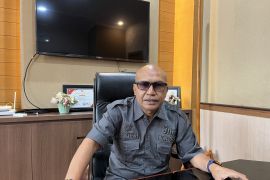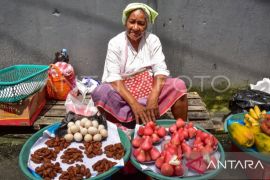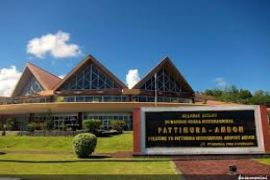The Sound of Green (SoG) Music Forest was the brainchild of the director of Ambon Music Office (AMO), Ronny Loppies, and activists from Boyratan art studio of Amahusu. With their vision, the area was transformed into a new attraction for Ambon residents that fuses music with nature preservation.
AMO is a music-based creative city manager that was set up based on the Ambon Mayor's Decree Number 45 of 2019. The institution works under the Ambon city government and has been tasked with implementing strategic programs to maintain Ambon city's status as a World City of Music.
As part of its duties, the office has carried out several activities, including studies and visits to other countries for benchmarking music.
The idea of creating a music forest emerged after the visit of the AMO team and representatives of Ambon musicians to Jinju City, South Korea, in 2022. This was followed by finding the right location to develop the Sound of Green.
Finally, Amahusu village was picked because the area is a major tourist destination, especially for music, in Ambon due to the presence of the Ambonia Ukulele music community and the Boyratan art studio.
Amahusu is also famous as the hometown of legendary singer Zeth Lekatompessy.
Next, the music forest was developed by the land owner, Jonas Silooy, who provided five hectares of land for the construction of supporting facilities in the forest.
Earlier, the forest was only planted with trees such as clove and nutmeg to meet his family's needs.
The Tourism and Culture Office of Ambon City extended full support for the development of the Sound of Green forest in Amahusu considering its real impact on community development, especially in the creative economy, social, and environmental aspects.
With the city entering its fifth year as a UNESCO City of Music, the Ambon city government and AMO are continuing to maintain its distinctive character by providing a space for the music community to develop their creativity.
The government is giving space to the community, both songwriters and musicians, to create new work as well as innovative products through music training, music discussions with communities, as well as music recordings at AMO's recording studio.
At the musical forest, AMO is also preparing facilities where creative economy players can sell Maluku cuisine and crafts, such as miniature instruments.
All these efforts are aimed at creating community independence to demonstrate that youths in Ambon city are progressing in terms of creativity and innovation.
The SoG Musical Forest has had an indirect impact on the Sustainable Development Goals (SDGs), namely lowering the impact of climate change and associated phenomena, including landslides by planting more trees. The trees have also contributed to an increase in oxygen levels.
The musical forest, which has become an icon of Ambon, also has a space for exhibiting the products of micro, small, and medium enterprises (MSMEs).
The presence of the musical forest is in line with Ambon's musical tourism development agenda focused on 10 main tourist destinations in five sub-districts of Ambon, which seeks to enhance the community's welfare.
Planting trees
In addition to preserving trees, music artists working in the SoG Musical Forest have also demonstrated their concern for nature by planting tree seedlings of various types, such as jackfruit, breadfruit, titi (Gmelina moluccana), gomu (Artocarpus blancoi) and tui bamboo (Schizostachyum lima).
Bamboos serve as the main material for making flutes in Maluku, especially Ambon, while titi wood is used to make the tifa (drum) and rebana (tambourine).
Wood from breadfruit, gomu, and jackfruit trees is also used to make Hawaiian musical instruments and ukuleles.
The artists planted 100 seedlings of each type of tree under a tree-planting movement carried out by AMO in cooperation with the Forestry Faculty of Pattimura University (Unpatti), which selected the right trees for the musical forest area.
To make people's access to the forest easier, a 150-meter-long footpath was also built.
Assistance
The Maluku and North Maluku main unit of state-run electricity company PLN has provided assistance of Rp350 million (around USD22,744) for the SoG Musical Forest's development, which was released in two phases.
In the first phase, the state-run company provided assistance for the construction of gazebos in the forest for people to relax in. In the second phase, it built gazebos for MSMEs and tree houses; connected electricity networks; as well as set up a tifa and flute production facility.
Going forward, tifa and flute production facilities owned by art studios in Ambon will be moved to the musical forest. Thus, in addition to enjoying musical performances in nature, visitors will also get to see how musical instruments are made.
The hope is that the forest will not only attract international tourists but also locals. In the initial stage after the inauguration, the forest has been opened for free. Later, there will be tickets to enter the forest area and the money from tickets will go to the Boyratan art studio.
According to the general manager of the Maluku and North Maluku office of PLN, Awat Tuhuloula, the assistance is in line with the company's commitment to support Ambon as a city of music.
Environmental conservation
AMO director Loppies informed that his office held a meeting with academicians from the Forestry Faculty of Unpatti to discuss environmental conservation and climate change mitigation efforts.
The meeting covered the establishment of permanent measurement plots (PUP), measurement techniques, and calculation of carbon reserves in the SoG Musical Forest to maintain environmental sustainability and as a real contribution of music artists to reducing greenhouse gas emissions and maintaining Ambon's identity as a city of music.
The measures are also expected to improve the community's awareness about strengthening environmental conservation in Ambon.
The Sound of Green program has indirectly shown how a green open space can be managed, particularly to produce plants.
In the aspect of tourism, the SoG Musical Forest could help promote Ambon and Indonesia to the world. To this end, Ambon will host the ASEAN Music Cities Forum in October 2024.
The forum will be attended by representatives from Ipoh (Malaysia), Suphanburi (Thailand), Da Lat (Vietnam), and Jinju (South Korea).
Related news: Maluku's Ambon to host ASEAN Music Cities Forum
Related news: Ambon delegation presents Sound of Green program at UNESCO conference
Editor: Rahmad Nasution
Copyright © ANTARA 2024









